By knowing the food that causes insomnia, you can avoid it. When you have insomnia, you will find it hard to fall asleep and also struggle to stay asleep. This lack of sleep then makes you feel tired during the day and can make it hard to concentrate and focus. This impacts your life, by affecting your mood, resilience, and immunity. All of which can lead to other health problems and diseases. While there are many potential causes of insomnia, diet may be one of them. Certain foods can disrupt your sleep patterns and make it harder to get the rest you need. In this post, we’ll explore some of the worst offenders when it comes to insomnia-causing foods.
Caffeinated beverages:
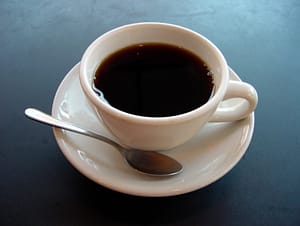 Caffeine is a naturally occurring psychoactive compound found in coffee, tea, and energy drinks. Because it is a stimulant, it can make it difficult to fall asleep in the first place and, more significantly, tends to wake you up during the night (1). It also acts as a diuretic (2), which means it makes you need to go to the toilet. This also contributes to waking you up during the night, which is the last thing you need if you struggle to sleep due to insomnia.
Caffeine is a naturally occurring psychoactive compound found in coffee, tea, and energy drinks. Because it is a stimulant, it can make it difficult to fall asleep in the first place and, more significantly, tends to wake you up during the night (1). It also acts as a diuretic (2), which means it makes you need to go to the toilet. This also contributes to waking you up during the night, which is the last thing you need if you struggle to sleep due to insomnia.
Something else worth considering is the link between caffeine and anxiety. Caffeine acts on the central nervous system (3), and while many people get a temporary boost of energy after drinking coffee or another caffeinated beverage, others experience feelings of jitteriness and restlessness. This is because excessive caffeine intake can lead to even higher levels of anxiety (4), which in turn can trigger insomnia. Studies have shown that people who struggle with chronic anxiety often exhibit symptoms of insomnia, including difficulty falling asleep and staying asleep throughout the night.
These issues can continue to fuel each other, creating a cycle of caffeine-induced anxiety that leads to ongoing sleep loss. Ultimately, it is important for individuals with anxiety to be mindful of their caffeine intake in order to minimize the risk of additional sleep struggles. Something worth noting is that women tend to drink slightly less coffee than men (5). However, it causes their blood pressure to rise more than their male counterparts (6). This link between high blood pressure and insomnia (7) is another reason to ditch the caffeine.
Caffeinated Foods:
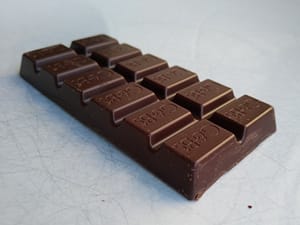
Something that may not have occurred to most people is the idea that our genes can impact the way that we respond to caffeine. Biological variations of specific genes actually play an important role in determining how even a small dose of caffeine can impact your sleep (10).
The influence of your genes on your response to caffeine is quite significant and cannot be ignored. If you have trouble getting good sleep even after consuming just a small amount of caffeine, it may be worth investigating whether you are genetically predisposed to respond differently than others do to this common stimulant.
If you don’t sleep well, you may be tempted to drink coffee, or so-called energy drinks, to keep yourself awake and focused during the day. Unfortunately, this will have a counterintuitive effect, disrupting your night-time sleep.
If you’re struggling with insomnia, it’s best to avoid caffeine in the evening or maybe completely.
Spicy foods:
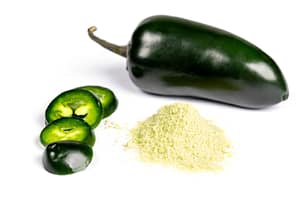
If you are already suffering from heartburn and indigestion, lying down will make it worse. This is because stomach acid can creep up into the throat. On its way, it burns the delicate lining of the tube linking the stomach with the throat (esophagus). Strangely, eating spicy foods, such as those flavoured with ginger, chilli or pepper, raises the body’s temperature (12). Good sleep hygiene protocols recommend that lower temperatures are conducive to quality sleep. So if you suffer from insomnia, anything that raises your temperature is a no-no!
There is anecdotal evidence that spicy food can lead to nightmares and bizarre dreams. While there is no scientific research to back this up, there is evidence to show that high temperatures, such as fever, can induce these upsetting images while you are asleep (13). While this is a tenuous link, there may be some truth in it. If you like spicy food and are having bad dreams that disturb your sleep, take the hint!
With all that said, if you struggle with insomnia, it may be worth trying to avoid spicy food within three hours of turning in for the night.
Fatty foods:
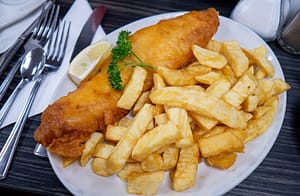
When you go to bed, the digestive system slows down. Your body is built to digest food during the day, not at night. Therefore, a lack of enzymes and slow digestion during the evening and night can lead to indigestion (14). This is compounded by lying down, as gravity isn’t helping the food travel through your gut in the same way as it would during the day. So, eating high-fat foods close to bedtime affects your sleep. It’s because you are kept awake or wake up due to the pain and discomfort in your stomach and gut.
On top of that, how quickly you fall asleep, the quality of your sleep and the restorative and repairing benefits of sleep are all affected by eating fatty foods close to hitting the sack (15). Unfortunately, this is worse if you happen to be a woman (16)!
One study has also suggested that the metabolism of fatty foods reduces the signal for melatonin (the sleep hormone) to be released. This is a very complicated biological process, involving the enzyme P-elF2α that goes on inside cells (17).
So the take home message, if you suffer from insomnia, is that fatty foods are best avoided close to bedtime, and preferably restricted completely.
Sugar:
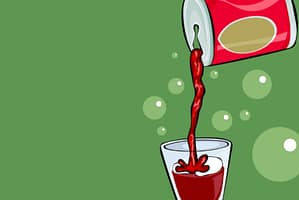
This happens due to the rapid release of sugar into the bloodstream and is closely followed by a sugar crash. This can make us feel hungry, and that makes it difficult to sleep (18). Going to bed hungry is not what you want, especially if you suffer from insomnia. And the urge to eat something else would just compound the problem with undigested food in the gut at bedtime, leading to indigestion and heartburn, as explained in the fatty foods section.
Many people have a hot milky drink before bed. If that is something you do, avoid adding sugar as this has been linked to the length of time that you sleep for (19).
In addition, eating sugary foods before bed can cause disturbed sleep due to bad dreams or nightmares (20). If you want sweet dreams, avoid sugar before bedtime.
Sleep on It!
If you struggle to sleep, it may not have occurred to you that what you eat can affect your sleep. While there are other foods that can cause insomnia, caffeine, fat, sugar and spices are the main offenders. Armed with this information, hopefully, struggling with insomnia will no longer be a problem. You don’t have to create a biohacking diet (check out our article What is a Biohacking Diet) , you just have to lay off a few foods and you can say goodbye to foods that cause insomnia!
In conclusion, it’s important to be aware of the foods that cause insomnia. By avoiding these foods, you’ll be well on your way to getting a good night’s sleep. If you continue to have trouble sleeping, be sure to consult with your doctor.
References
- Caffeine consumption, insomnia, and sleep duration: Results from a nationally representative sample https://pubmed.ncbi.nlm.nih.gov/27377580/
- Effect of caffeine on bladder function in patients with overactive bladder symptoms https://www.ncbi.nlm.nih.gov/pmc/articles/PMC3036994/
- What to Know About Caffeine Use https://www.verywellmind.com/what-are-the-effects-of-caffeine-on-the-brain-21842
- Association between ADORA2A and DRD2 Polymorphisms and Caffeine-Induced Anxiety https://www.nature.com/articles/npp200817
- Total coffee per capita consumption in the United States in 2020, by gender https://www.statista.com/statistics/457420/total-us-coffee-per-capita-consumption-by-gender/
- Gender Differences in Subjective and Physiological Responses to Caffeine and the Role of Steroid Hormones https://www.ncbi.nlm.nih.gov/pmc/articles/PMC3621315/
- Sleep loss and hypertension: a systematic review https://bit.ly/3vR8DSy
- Theobromine https://www.ncbi.nlm.nih.gov/books/NBK507032/
- caffeine https://www.medicines.org.uk/emc/ingredient/731
- “No Thanks, Coffee Keeps Me Awake”: Individual Caffeine Sensitivity Depends on ADORA2A Genotype https://www.ncbi.nlm.nih.gov/pmc/articles/PMC3368971/
- Sleep & GERD https://aboutgerd.org/signs-and-symptoms/sleep-gerd/
- Spicy meal disturbs sleep: an effect of thermoregulation? https://pubmed.ncbi.nlm.nih.gov/1399758/
- What Are Fever Dreams (and Why Do We Have Them)? https://www.healthline.com/health/fever-dream
- Circadian rhythms in the pathogenesis of gastrointestinal diseases https://www.ncbi.nlm.nih.gov/pmc/articles/PMC6189841/
- Relationship between Food Intake and Sleep Pattern in Healthy Individuals https://www.ncbi.nlm.nih.gov/pmc/articles/PMC3227713/
- Sleep EEG, depression and gender https://deepblue.lib.umich.edu/bitstream/handle/2027.42/60179/Armitage%2C%20Hoffmann%202001.pdf?sequence=1
- Relationships among dietary nutrients and subjective sleep, objective sleep, and napping in women https://www.ncbi.nlm.nih.gov/pmc/articles/PMC2819566/
- High glycemic index and glycaemic load diets as risk factors for insomnia: analyses from the Women’s Health Initiative https://www.ncbi.nlm.nih.gov/pmc/articles/PMC6997082/
- Short and sweet: Associations between self-reported sleep duration and sugar-sweetened beverage consumption among adults in the United States https://www.ncbi.nlm.nih.gov/pmc/articles/PMC5380400/
- Dreams of the Rarebit Fiend: food and diet as instigators of bizarre and disturbing dreams https://www.frontiersin.org/articles/10.3389/fpsyg.2015.00047/full

